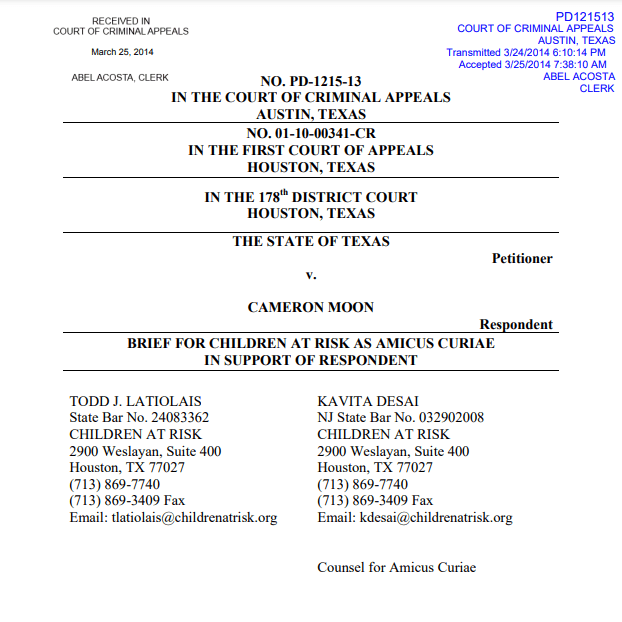
Summary of Argument
Just as the law requires, scientific findings regarding children’s brain development and research regarding the negative effects of adult incarceration on children necessitates strict adherence to the procedural protections of §54.02(f). In the decision below, the Court of Appeals found that the evidence supporting the juvenile court’s decision to transfer Cameron Moon to adult court was insufficient with regard to his “sophistication and maturity” and “the prospect of adequate protection of the public and the likelihood of Moon’s rehabilitation.” State v. Moon, No. 01-10-00341-CR, 2013 WL 3894867 at *24 (Tex. App.—Houston [1st Dist.] July 30, 2013). The court held that the only factor weighing in favor of certification was in relation to Moon’s alleged offense, and as such, the juvenile court abused its discretion in approving his transfer to adult court. Ibid. The decision of the Court of Appeals was correct, and the State is wrong in arguing that a juvenile court can certify a child as an adult based merely on the nature of the crime.
The overwhelming consensus of case law and academic research indicates that juveniles are less culpable for their offenses and more amenable to rehabilitation than adults and that these two characteristics of youth exist regardless of a juvenile’s alleged offense. Adolescence is a time of important physiological changes in juveniles’ brain development, resulting in increased propensity for risk-taking and greater susceptibility to peer pressure. While these characteristics of youth can lead to criminality, they also typically resolve with age, and most juvenile offenders do not go on to commit crimes as adults. To adequately address the juvenile’s status as a child, a court must consider all the TEX. FAM. CODE §54.02(f) factors before making a decision to transfer. Certification as an adult has far-reaching consequences for a juvenile, as adult prisons and jails are profoundly dangerous places for children and are not equipped with the resources necessary for their rehabilitation. Children who are certified as adults are often held in solitary confinement at tremendous cost to their mental health. Furthermore, children who are incarcerated in adult facilities are at shockingly high risk for physical and sexual assault, and are much more likely to recidivate than children in juvenile facilities. As such, the welfare of society necessitates that certification must be reserved for truly extraordinary cases and cannot be based on the alleged crime alone.